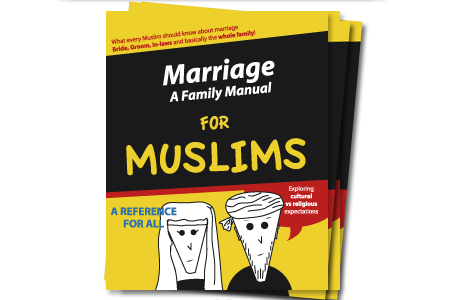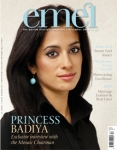
The trouble with marriage
Issue 75 December 2010
Marriage is a topic which is difficult to discuss, and in which to create change for Muslims. No wonder, since it comes with heavy religious weight and touches on almost every aspect of life.
Most young people aspire to a mutually fulfilling relationship in marriage, but this can sometimes take longer than they might like and throw up significant challenges. The lack of community standing for unmarried individuals is one such challenge. The unmarried are seen as children yet to acquire maturity. This is evidenced in simple words such as the reference to the unmarried as ‘the boy’ and ‘the girl’ rather than as grown men and women.
In particular, a woman in many Muslim communities only seems to acquire social standing after her marriage. She is advised that she will be given her freedoms once she has arrived in her husband’s home and becomes her husband’s responsibility. Single women must remain cautious of what they say and do because any unrestrained word or action will affect their marriage prospects. It’s almost as though she isn’t a real person if she’s unmarried.
But just because “marriage is half your faith,” does not make an unmarried individual half a person. An increasing point of contention is how much choice the man or woman has in selecting their future spouse, and how much is done under the direction of their parents. It is a false dichotomy with which many families pressurise their children: that you may choose your own spouse or be loyal to your parents and culture. Of course, advice, encouragement and support from parents is invaluable – but ultimately the decision must rest with the individuals concerned.
The problem is that marriage is often seen as a cultural activity, and so cultural factors become more significant than religious directives. It’s about picking the ‘right’ family or the ‘right’ caste (didn’t Islam do away with castes?); the ‘right’ job or the ‘right’ wealth. Or it’s about picking someone from ‘back home’ as the ‘right’ thing to do – to find a more compliant wife; to transport the extended family over to Britain; or to ensure that undue pressure can be exerted in internal family matters. For many years, the blame for challenges to the marriage process was laid at the door of parents and families. And the issues above (by no means an exhaustive list) continue to persist.
However, new challenges are beginning to emerge which need to be openly discussed in order to find solutions. Despite the pressure to marry ‘within’ the culture, traditional networks of extended families and matchmakers are breaking down, unable to connect prospective spouses who are a good match for each other. So where to go to look for ‘The One’? New arenas are opening up – such as online matrimonial sites, speed dating, or marriage events. These are good opportunities, but are complicated to navigate and have plenty of pitfalls for the uninitiated. Speed dating is a particularly thorny one – how can you possibly get past the superficial layer of knowing someone in a mere three minutes? And internet sites can be just as perilous, with caution being required when dealing with unknown and distant parties.
By far the most challenging is managing the expectations of the two individuals, and ensuring men and women have an understanding of the other so that a relationship can be properly constructed. It is worrying how often complaints are levied that “women are only looking for a big bank balance” and “men are only after a pretty doll.” Laughable though these may seem, such misleading expectations range from the superficial to much deeper differences in attitudes about what a marital relationship should entail. And these differences are rarely discussed until it’s too late.
With all the emphasis on family, culture and social conformity, what is forgotten is to nurture the new relationship that is being formed. The wedding becomes the big event instead of the marriage. We need to reverse this situation.
Marriage lessons, or pre-marital counselling, ought to be a must for the couple – and for both sets of in-laws too. Perhaps those conducting nikahs should insist on such lessons before agreeing to perform the religious rites – thereby investing in the long term durability of the marriage.
If we want to reverse the tide of difficulties in the spouse selection process, and to stem the rising divorce rate, then we need to identify the underlying problems. And we need to do that very difficult thing: recognise the problems and create change in our cultures and attitudes.
Shelina Zahra Janmohamed is the author of Love in a Headscarf, and writes a blog at www.spirit21.co.uk
Click here to read more of her articles in emel Magazine.
Bookmark this |
|
Add to DIGG |
|
Add to del.icio.us |
|
Stumble this |
|
Share on Facebook |
|
Share this |
|
Send to a Friend |
|
Link to this |
|
Printer Friendly |
|
Print in plain text |
|


Comments
5 Comments
1
farid
30 Jun 11, 16:58
i think converts muslim women should get married to covert
men only, because most marriages with a born muslim don't
work. the converts they try to bend islam sometimes when it
doesn't work their way. they say music it's hallal, while is
shubuhat, and the prophet sallahalyhi wasalam, said stay
away with shubuhat. and when they get divorced and
remarry, they keep the kids with the by using a non muslim
court, and that haram , it will kill the heart of the kids by
seeing the mum with different man while biological dad is a
life and a muslim. may laah correct them inshallah,
2
farid
30 Jun 11, 16:56
i think converts muslim women should get married to covert
men only, because most marriages with a born muslim don't
work. the converts they try to bend islam sometimes when it
doesn't work their way. they say music it's hallal, while is
shubuhat, and the prophet sallahalyhi wasalam, said stay
away with shubuhat. and when they get divorced and
remarry, they keep the kids with the by using a non muslim
court, and that haram , it will kill the heart of the kids by
seeing the mum with different man while biological dad is a
life and a muslim.
3
hocine.ghalem@yahoo.fr
23 Apr 11, 18:55
Marriage in Islam is obligatory for one who has the
capability to do so, it is half the liver as ennoncé
qssl by our prophet, I know that nowadays many
people have a complicated document and on the
other hand, it has become unreachable given the
bill purchases necessary for the wife and the hadith
of our Prophet said < اقلكم مهرا اكثركم بركة > procedures
for marriage are clear and in the Koran and the
hadith but we are highlights customs in general so
full of sins without inevitably leading Islamic
foundation in the wrong agreement between the
spouses and eventually divorce.
4
umar
28 Dec 10, 07:16
I think we should thoroughly study the actions of the Prophet PBUH and his companions RA in this matter, and boldly act upon them to set modern examples, otherwise the tug-of-war between modern western and conservative eastern cultures will not let us go out of utter confusion.
5
1R4M
8 Dec 10, 18:31
finaly!
Thank You Shelina!
Women are CONSTANTLY told that we can "do what we like" AFTER we get married
NOT TRUE
spot on whe you wrote that a woman's standing goes up when she gets married
its ridiculous
good article